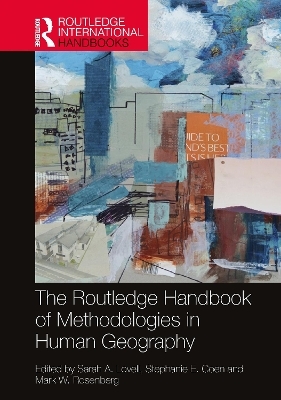
The Routledge Handbook of Methodologies in Human Geography
Routledge (Verlag)
978-0-367-48252-7 (ISBN)
The Routledge Handbook of Methodologies in Human Geography is the defining reference for academics and postgraduate students seeking an advanced understanding of the debates, methodological developments and methods transforming research in human geography.
Divided into three sections, Part I reviews how the methods of contemporary human geography reflect the changing intellectual history of human geography and events both within human geography and society in general. In Part II, authors critically appraise key methodological and theoretical challenges and opportunities that are shaping contemporary research in various parts of human geography. Contemporary directions within the discipline are elaborated on by established and emerging researchers who are leading ontological debates and the adoption of innovative methods in geographic research. In Part III, authors explore cross-cutting methodological challenges and prompt questions about the values and goals underpinning geographical research work, such as: Who are we engaging in our research? Who is our research ‘for’? What are our relationships with communities?
Contributors emphasize examples from their research and the research of others to reflect the fluid, emotional and pragmatic realities of research. This handbook captures key methodological developments and disciplinary influences emerging from the various sub-disciplines of human geography.
Sarah A. Lovell is a Senior Lecturer in the Faculty of Health at the University of Canterbury, New Zealand. Stephanie E. Coen is an Associate Professor in the School of Geography at the University of Nottingham, UK. Mark W. Rosenberg is a Professor of Geography in the Department of Geography and Planning and cross-appointed as a Professor in the Department of Public Health Sciences at Queen’s University in Kingston, Ontario, Canada.
Introduction Part I: Origins, Reflections and Debates 1 The Great Debate in Mid-Twentieth-Century American Geography: Fred K. Schaefer vs. Richard Hartshorne 2. The Archive and the Field: Methodological Procedures and Research Outcomes in the Work of Carl O. Sauer (1889-1975) 3. The Quantitative Revolution 4. Towards Interdisciplinarity: The Relationship between GIS/GIScience/Cartography and Human Geography 5. Reflections on Human Geography’s Methodological ‘Turns’ 6. For an Intersectional Sensibility: Feminisms in Geography 7. Making Space for Indigenous Intelligence, Sovereignty and Relevance in Geographic Research 8. Geohumanities: An Evolving Methodology Part II: Methodologies of Human Geography’s Sub-Disciplines 9. Affective Landscapes: Capturing Emotions in Place 10. Geography’s Sexual Orientations: Queering the Where, the What, and the How 11. Political Geographies: Assemblage Theory as Methodology 12. Indigenous Geographies: Researching and De-colonising Environmental Narratives 13. Storytelling in Anti-colonial Geographies: Caribbean Methodologies with World-Making Possibilities 14. Historical Geographies: Geographical Antagonism and Archives 15. Black Geographies: Methodological Reflections 16. Digital Geographies and Everyday Life: Space, Materiality, Agency 17. GIS Science: Addressing Aggregation and Uncertainty 18. Health Geographies and Big Data Adventures: Methodological innovations, opportunities and challenges 19. Geographies of Disability: On the potential of Mixed Methods 20. Methodologies for Animal Geographies: Approaches Within and Beyond the Human 21. Urban Geographies: Comparative and Relational Urbanism 22. Economic Geographies: Navigating Research and Activism 23. Geographies of Education: Data, Scale/Mobilities and Pedagogies 24. Children’s Geographies: Playing with Participatory Methods 25. Anarchist Research Within and Without the Academy: Everyday Geographies and the Methods of Emancipation Part III: Cross-cutting Issues in Human Geography Methodologies Section Introduction 26. Politics, Institutions and Place: Researching Sensitive Subjects in Urban Contexts 27. Navigating Ruralities in Human Geography Research: Reflections from Fieldwork in Complex Rural Settings 28. Participatory Geographies: From Community-Engaged to Community Led Research 29. The Methodological Implications of Integrating Lived Experience in Geographic Research on Inequalities 30. What Role for More-Than-Representational, More-Than-Human Inquiry? 31. Dear Feminist Collective: How Does One Take Up Slow Scholarship (in the Midst of Crises)? 32. Refining research methodologies to make a difference in policy
| Erscheinungsdatum | 13.10.2022 |
|---|---|
| Reihe/Serie | Routledge International Handbooks |
| Zusatzinfo | 2 Tables, black and white; 13 Line drawings, black and white; 16 Halftones, black and white; 29 Illustrations, black and white |
| Verlagsort | London |
| Sprache | englisch |
| Maße | 174 x 246 mm |
| Gewicht | 920 g |
| Themenwelt | Schulbuch / Wörterbuch ► Lexikon / Chroniken |
| Naturwissenschaften ► Geowissenschaften ► Geografie / Kartografie | |
| ISBN-10 | 0-367-48252-5 / 0367482525 |
| ISBN-13 | 978-0-367-48252-7 / 9780367482527 |
| Zustand | Neuware |
| Informationen gemäß Produktsicherheitsverordnung (GPSR) | |
| Haben Sie eine Frage zum Produkt? |
aus dem Bereich


